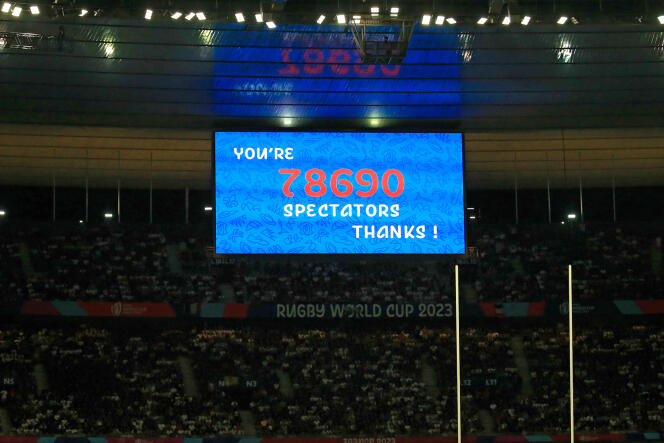


The opening ceremony of the Rugby World Cup was intended to celebrate France. French movie star Jean Dujardin, wearing a white Marcel undershirt and beret, delivered loaves of bread on a scooter across the lawn of the Stade de France. The 20-minute performance had been crafted as an ode to gastronomy and bal musette à la française. Reactions were mixed, to say the least, but the message was clear: The international competition, which runs from September 8 to October 28, is taking place in France.
Yet on the banners inside the stadium, the pennants in the host cities, and the official tournament website, the English words "Rugby World Cup France 2023" are all over the place. On the French version, "opening match" has replaced "match d'ouverture," "pool" has replaced "poule" and "next match" "prochain match." Strangely enough, a few days after Le Monde asked the French culture ministry about the issue, some English terms were translated into French.
This intrusion of English into an event held in France is a cause for concern among some. "The status of the French language should be respected when France organizes major international sporting events," lamented Loïc Depecker, a former delegate for the French language at the culture ministry. "At this Rugby World Cup 2023, organized in France, the [text of the] French team jersey is written in English." This looks bad for French President Emmanuel Macron, who sad the defense of Francophonie [the people and countries who speak French around the world] would be one of his priorities. He is preparing to inaugurate, on October 19, the Cité Internationale de la Langue française (International City of the French Language) at a castle in Villers-Cotterêts, northern France.
In a written question, Annie Genevard, a member of Parliament, "alerted" Culture Minister Rima Abdul Malak "to the importance of avoiding the abusive use of English in signage, advertising, ticketing, announcements, refereeing, results display panels and field-side advertising strips." "Is this issue being considered? Is it being worked on?" she wondered.
Article 3 of legislation passed on August 4, 1994, on the use of the French language, specifies that "any inscription or announcement placed or made on the public space, in a place open to the public or a means of public transport and intended to inform the public must be in the French language."
"The law, from particular commercial standpoints or when relating to slogans and registered trademarks, outside the obligations imposed on public players, shows its limits at times," conceded the ministry. According to Alfred Gilder, a French writer who once sat on a language body at a French justice and finance ministry, "Article 3 is very poorly implemented." Daniel Zielinski, a senior official in charge of the French language at the French Sports Ministry, is a member of an expert panel responsible for sports terminology. For the World Cup, a list of rugby vocabulary was published in the French government's official gazette on September 5.
You have 37.42% of this article left to read. The rest is for subscribers only.
